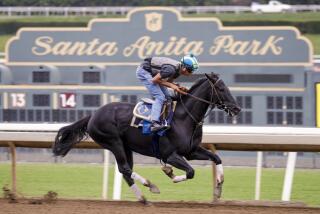BELL : City Not Betting the House on Card Club
- Share via
With the opening of the Bell Jackpot Casino last week, the potentially lucrative business of gambling is back in the city for a third time.
Although it’s a player again in the $7.5-billion California card club industry, the city is hedging its bets.
Unlike neighboring Bell Gardens and Commerce, where casino tax revenue accounts for 60% and 40% of the general funds, respectively, Bell is not going to bank on the same kind of results for its budget.
The history of Bell’s casinos, tainted by corruption and mismanagement, has made the city extra-cautious in how it plays its cards with the Jackpot, the site of two defunct casinos.
The casino “could be here today and gone tomorrow,” said Robert Rizzo, Bell’s chief administrative officer. “The city doesn’t want to get caught in the same trap it got caught in last time.”
Still, the city is optimistic about the chances of success for the Jackpot. Orange County investors James Knapp and his son, Gregory, who have leased the property to other operators for 15 years, are now running the casino. The Knapps are part of the Brookhollow Group, a 20-year-old investment and development organization, which owns part of the highly successful Crazy Horse Steak House country-western club in Santa Ana.
The Knapps also received a vote of confidence and a financial boost Thursday when Santa Anita Cos., owners of Santa Anita race course, purchased an option from the Knapps to buy 50% of the card club. The transaction would take place if the state passes a law to allow publicly held companies to own interests in gambling concerns.
The Jackpot was called the California Bell Club when it opened in 1979, and it became a successful poker parlor with many of the Asian games the Jackpot hosts today. The club added more than $2 million a year to city coffers.
But a succession of scandals, including the conviction of two former city administrators for a racketeering scheme in 1984, followed. In 1987 the club’s managers were accused of skimming more than $1.5 million from the business. And in 1990, new owners were ordered to close the troubled club by a federal bankruptcy judge after only a year of operation.
John Chi bought the club the following year, renaming it the Regency, but quickly sent it into bankruptcy. Chi left the country in 1992, never to be seen again, and the city of Bell was left without an operation that had been the source of one-fifth of its general fund.
Hoping that the club would reopen, the city continued to plan for the roughly $80,000 a month in tax revenue that it had provided, with the hopes that the club would reopen. When the casino remained closed, about a dozen city jobs were cut and several city services were hampered by the budget shortfall.
Despite its history, the new casino looms as a potential jackpot for the city and perhaps a shortcut in balancing its checkbook. The operation will be monitored by Bell’s Western Gaming Consultants.
The City Council unanimously sanctioned the opening of the 45-table casino last fall. The Jackpot obtained all its operating licenses, from gambling to food and beverages, Feb. 1 and opened two days later.
Rizzo said none of the tax revenue from the casino will be budgeted into the general fund until the casino proves its stability, which may take years.
About $500,000 of the city’s $1.7-million debt was paid last year without casino tax revenue. Officials hope to lower the balance even more this year, Rizzo said. In attempting to balance its $5.5-million budget, the city has taken measures such as deferring work on streets.
“If the club is up and running and doing well, it would be less than 20% of the total budget. But it’s not a situation where it’s 40% to 60% of the city’s budget. We don’t want to put all our eggs in one basket,” Rizzo said.
The Knapps are banking on Jerry Jackway, who for eight years managed the Bicycle Club in Bell Gardens. He wants to provide a more intimate atmosphere at the 45-table club, which has room to expand to 60.
Some gamblers are often put off by the grandeur of the Bicycle Club and the Commerce Casino, and that’s where the Jackpot fits in, he said.
Besides the usual poker games and Asian-influenced blackjack variations found in most casinos, the Jackpot also boasts two new games, Ultra 9 and 9’s Up. Vincent Oliver, a law student and gaming consultant for the club, teamed up with Michael Hesse to create Ultra 9, a hybrid blackjack game.
Like all card games in California, the house makes its money from renting seats. Players bet among themselves.
More to Read
Inside the business of entertainment
The Wide Shot brings you news, analysis and insights on everything from streaming wars to production — and what it all means for the future.
You may occasionally receive promotional content from the Los Angeles Times.










